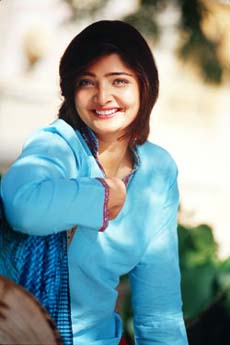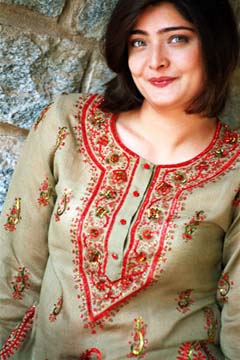Arts
Vasundhara Das

I Must Be Doing Something Right!
|
She is trained in Hindustani classical music, but her passion is Flamenco. She never wanted to be a playback singer in Bollywood and here she is churning out blockbuster hit after hit beginning with her debut song with none other than the musical genius A.R.Rahman. The song “Shakalaka Baby” not only netted her the *Filmfare* award for best female singer, but also was a highlight of *Bombay Dreams*, the larger than life musical on Broadway and now playing across America. She didn’t know the ABC of acting, but found her self being directed and acting opposite the legendary superstar actor Kamal Hassan in her very first film *Hey Ram*, and then making waves with Mira Nair’s *Monsoon Wedding.* In an exclusive interview with Little India’s Kavita Chhibber, Vasundhara Das talks about her journey and what has worked well for her.
So do you come from a musical family?
Well my family has always been into music and it has been my grandmother’s passion, but Tamil Brahmin girls in her time did not pursue music professionally. Plus she had four kids at a relatively young age and was busy. She did however continue to sing and dreamed that maybe one of her four kids would take it up seriously. That didn’t happen either. Then she looked at her grandkids with great hope, but when none of them showed any serious inclination. I the youngest grandchild was the one she anointed as the chosen one. And then you fell in love! But it also got me very interested in Rock and Roll and I started listening to the Beatles and also a lot of African American singers like Bobby Brown and Whitney Houston. So when I came back, the girl who hrefused to listen to anything but Indian classical music, now listened to anything but Indian classical music. My mom was very supportive. She knew this was eventually bound to happen. I actually became disillusioned with Indian classical music as Alisha was rising and Indi-pop became hip. Bangalore was already one of the key centers for Rock and Roll. By the time I was in high school Lalita Kaikini told me I had already gone beyond what she could teach me. As luck would have it, the man my mother had always thought to be the ultimate dream teacher for me, but who didn’t live in Bangalore any more, came back. Pandit Parmeshwar Hegde is one of those rare men, who is not only an extraordinary vocalist with great technique, he is an equally outstanding teacher. While Lalita Kaikini got me interested in music, Pandit Hegde was the man responsible for making music the consuming passion in my life, to the point that I knew I couldn’t do without it any more. I was however getting more and more interested in western music. I also joined Mount Carmel College which had a phenomenal western music association. I started participating in competitions and dabbling more and more in western music. That upset Pandit Hegde so much that he hrefused to talk to me for a year. I realized after a while that I really needed him in my life and I went back to him. I told him, “I’m not going to give up Hindustani classical music, but you have to support me by being open minded enough to accept that I am interested in other genres of music.” I have to give him so much credit that he understood and never discouraged me again. It was wonderful that when we resumed we would have extensive discussions on whatever I did, and at the same time he trusted me to do the right thing with Indian classical music. He was always there to give me the right foundation for whatever I did. Where did dabbling in different kinds of music take you?
Actually college was very busy and fulfilling. I was a member of their choir, which was a nationally recognized and honored one. Inside college I did the choir, outside I interacted with other musicians and their bands. There was a monthly gathering of musicians who came and performed and people came to watch. I started as a volunteer, encouraging musicians to come and then started jamming with them. It was in my second year of college that I met these amazing musicians from Columbia who had come to India to study tabla and sitar. We got to spend a month together and when they left I was hopelessly in love with Spanish music. I realized that to understand that music I would have to learn Spanish. I found a Spanish teacher and studied Spanish under her for three years, until she moved back to Spain. I visited her there. We would go to bars and get musicians to teach us Flamenco music. One of the musicians who initially thought we had er.. unholy intentions when we cornered him and asked him to come over to teach us Flamenco was kind enough to direct me to a school where I studied the rhythms, which in Flamenco are as intricate as ours and another was a course in vocals. I actually sang a Spanish song in a concert in Kerala and people loved it. I have traveled to so many places with my teacher and learned so much. How did you form your band Arya with drummer par excellence Roberto Narain? I decided to go to Madras on my own and meet various record labels, to get a record deal. I met Magnasound first, auditioned for them and they didn’t let me go anywhere else. I decided to do a Hindi one and that is how the album *Meri Jaan* happened. I went back with the CD to show Roberto I could do it without his help, very sure he wouldn’t like the stuff I did. Surprisingly he did, but he asked me one question, “Is *Meri Jaan* really who you are?” That had me thinking. He said I think you can do better. I needed that honest input and I started trying out different things. We stayed in touch and after traveling a lot for a couple of years, I decided to make Bangalore my home base. We created a studio together and in the four years that it took us to make that happen, we also met some other musicians whom we liked and formed the band Arya, which totally focuses on world music, and I have enjoyed traveling all over with them and performing. A.R. Rahman and Kamal Hassan signed you up pretty quickly as well! I got a call from mom that Kamal Hassan had called them and wanted to do a screen test for his film *Hey Ram.* I went with my family’s blessings and met him. I was a total tomboy and was expecting some skimpy clothes. Instead I found myself being draped in this Kanjeevaram heavy silk sari, a wig of long hair and flowers in my hair. I used to meet singer Hariharan and every time I met him, I’d ask him how to get a break on the music circuit. His jaw dropped when Kamal said, “I want you to meet my new heroine.” I was taken aback. I had not expected it and it also meant a commitment to him for a couple of months where my music will have to wait. Kamal saw that reticence and said, “We need to talk.” He then said to me, “Look I know you are a reluctant actress. I know the feeling. I’ve been there myself, because I started acting at 5. But you have to decide whether you will allow me to help you and if you will put in the effort.” He had approached my parents and me with such courtesy and graciousness that I found myself saying yes. There is a very intimate scene in the film. How did you manage it, and how was the experience in all?
He told me upfront about the scene and again with finesse. From the beginning to the end, we were like a big family. Each scene had its own challenges and Kamal is a perfectionist. The fun part came when he asked me to read some dialogues, He was thrilled when I read it in Hindi, for the Hindi version, and didn’t have a South Indian accent in my Hindi. But when I spoke in Tamil his eyes popped out. In spite of being a Tamilian, I didn’t realize that the spoken Tamil for that film had a different dialect. I still laugh when I remember that look as he said, “What did you just say Maam?” I had to work on my Tamil accent ironically! I still remember the first scene where the family comes to see me for the first time. I had to wear this thick kanjeevaram sari and sing for them. Kamal deliberately chose that scene knowing I was a singer to put me at ease. It was a very thoughtful gesture. You landed Mira Nair’s film Monsoon Wedding. How was that experience? The film was shot in 30 days and all the cast was asked to report two weeks in advance. All 60 of us stayed together like one big family. Naseeruddin Shah was amazing. Every day we had a workshop with him in the morning and in the afternoon we would be working with all the other departments, be it makeup or clothes or camera shots. It was a great learning experience for me. Mira used a lot of her family stuff. I actually wore her sister-in law’s wedding sari, the jewelry too was from the family. All her family members were present on the sets. It was great fun. Your playback career really took off with your very first song Shakalaka Baby with Rahman, and since then you have had many hits to your credit, with films like Kal ho Na Ho, Main Hoon Na, Salaam Namaste. You have also collaborated with Rahman and the 150 member music group fro Miami University. How has it been working with him? I think Rahman is not just a great musician, he is also a great technician. He is one of the big reasons that the music industry in India has risen above itself. He has raised the bar quite high. He is born with the soul of a great musician. That is something you cannot buy or learn. It is from within. He was also generous enough to let me bring my own influences on the table, whether they were Latin, Arab or whatever and that made me feel that the song I sang was truly my own. Global Rhythms is amazing. These are students from different ethnic groups and they sang all of Rahman’s songs without looking at any paper and with such joy. To get 150 people on stage together who don’t know the language and sing his songs in Tamil and Hindi was quite something. How have you seen the audience change over the years? I have been so lucky to have been able to do so many different things, and also to have the support of my parents as well as my guru who gave me the freedom to experiment, innovate and be my own person and now I see the audience has had enough of Bollywood and enough of star shows. They are ready for something different in music as well and my kind of music is being very well received. I guess I must be doing something right. |



